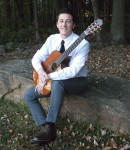Featured Guitar Teachers In Maryland

Robert L
Instruments: Guitar
In high school I won the MD Distinguished Scholarship in music performance, which allowed me to pursue a career in music performance. I attended UMBC and completed a music performance degree. Later I earned a degree in Music Education, and have been teaching in public school since 2003. I've taught privately, in after school Guitar Ensembles and Rock n Roll Workshops, as well as Life-Long Learning Classes. My students have gone on to attend Peabody Conservatory and the Berkeley School of Music. Read More

Darius S
Instruments: Piano, Guitar, Voice
My methods of teaching are primarily based on the individual. Within the first lesson, I make an assessment of the individuals musical abilities, and document the genres of music that interests the student. I then create a curriculum based on that assessment, which includes music theory, building repertoire (including music that interests the student), and music history/literature. I also encourage the student to engage in music competitions/auditions and student recitals. Read More

Brandon W
Instruments: Guitar, Bass Guitar, Electric Guitar, Acoustic Guitar
I place a strong focus on fundamentals, while customizing lesson plans based on the student's skill level and musical interests. Most importantly, I like to keep things fun for my students by finding out more about their favorite recording artists, and creating exercises that incorporate this into their learning. By connecting with these unique interests and encouraging regular practice, lessons are much more enjoyable for students. In addition , more traditional concepts such as music theory are also offered on request. Read More

Adam H
Instruments: Guitar, Drums, Bass Guitar, Electric Guitar, Acoustic Guitar
For beginners, it's important to carefully approach the basic skills so it's fun and not discouraging. For intermediate and advanced students, we hit the ground running and build on skills already developed while filling in any gaps too. Here's an example of how I structure a 60 minute drum lesson: warm up, technique drills, drum beat practice, song study, jam session Here's an example of how I structure a 60 minute guitar/bass lesson: warm up, technique drills, chords/composition practice, song study, jam session Read More

Paul Z
Instruments: Guitar
My teaching experience began at the age of 16. I have fell in love with the art of teaching and the connections I have made doing so. There have been many teachers in my life that have opened the musical door for me and have made a difference in my life. I want to be that person for aspiring musicians everywhere from all backgrounds. The reward I get from seeing a student accomplish something on the guitar is enough to make my life complete. Read More

BBB Accredited
Don't just take our word for it. We hold the highest possible A+ rating from the nations foremost online reliability source: The BBB. Check out our A+ rating from the Better Business Bureau.